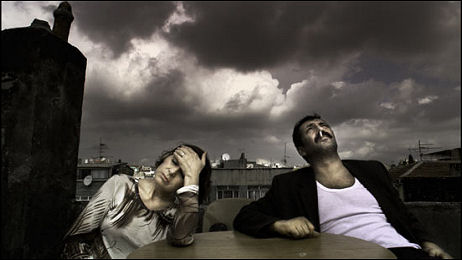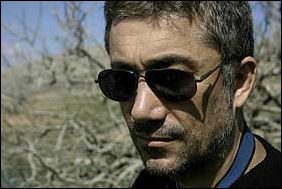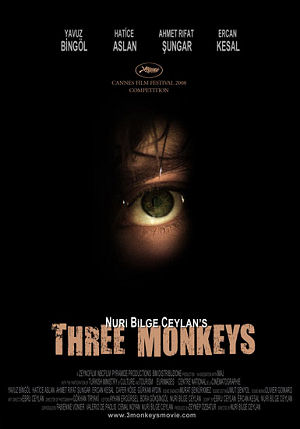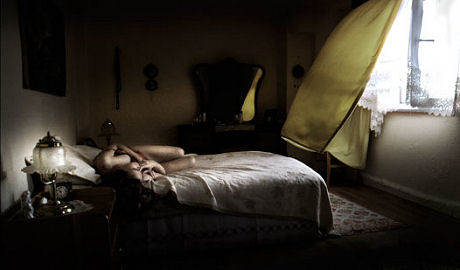The moral undercurrent in Nuri Bilge Ceylan‘s Three Monkeys — a quietly devastating Turkish family drama about guilt, adultery and lots of Biblical thunderclaps — is in every frame. It’s about people doing wrong things, one leading to another in a terrible chain, and trying to face or at least deal with the consequences but more often trying to lie and deny their way out of them. Good luck with that.

Hatice Aslan, Yavuz Bingol in Nuri Bilge Ceylan’s Three Monkeys.
I was hooked from the get-go — gripped, fascinated. I was in a fairly excited state because I knew — I absolutely knew — I was seeing the first major film of the festival. Three Monkeys is about focus and clarity in every sense of those terms, but it was mainly, for me, about stunning performances — minimalist acting that never pushes and begins and ends in the eyes who are quietly hurting every step of the way.
It’s a very dark and austere film that unfolds at a purposeful but meditative (which absolutely doesn’t mean “slow”) pace, taking its time and saying to the audience, “Don’t worry, this is going somewhere…we’re not jerking around so pay attention to the steps.”
A 50ish politician named Servet (Ercan Kesal), fighting off sleep as he drives on a narrow country road, hits a man and kills him. Freaked, he drives off without calling anyone. The next day he convinces the quiet-mannered Eyup (Yavuz Bingol), his longtime driver who’s abut the same age, to confess to the crime and do the jail term, promising to give him a lot of money in addition to paying his salary to his wife Hacer (Hatice Aslan), and son Ismail (Ahmet Rifat Sungar) while he’s in stir.
Except Servet soon takes advantage of Eyup’s absence of having it off with Hacer in a what-the-fuck recreational sense. (He’s a politician, after all.) The plot thickens when Ismail, a morose downhead to begin with, learns of the affair and starts twitching with anger and grief and guilt, not knowing what to do or say. Then Eyup gets out of jail and immediately starts to sense the after-vibe. Then we realize that Hacer hasn’t indulged with the boss out of lust or boredom or to keep him sweet but because she’s obsessively in love with the creep. (Good God.) Then matters get even worse.
Every step of the way you’re reading the characters, absorbing what they’re feeling or looking for, guessing what they might do, feeling their vulnerability, pulling for them, wanting to see it all come out right or at least end in a way that won’t result in more pain or ruination.
Ceylan and his cinematographer Gokhan Tiryaki are into filling their frames with muted but luscious browns, grays, blacks (lots of black) and faded greens. The visuals are such a bath that Three Monkeys almost deserves a standing ovation for this alone. But it’s the unstinting sense of engagement with the moral cost of what’s being done and lied about and covered up that matters. It’s heavy material, all right, but it’s not a reach to call it the stuff of classic tragedy. The script (by Ceylan, Ebru Ceylan and Ercan Kesal) is right up Will Shakespeare’s alley.

Nuri Bilge Ceylan
And ohhh, that thunder! Four or five times it growls and rumbles like God’s angry symphony. Lightning, too, at the very end.
I think Three Monkeys is fundamentally a political film because it’s telling an eternal political truth, which is that people with money and power rarely pay for their wrong-doings — they simply arrange for someone down the food chain to take the rap. And then sometimes they fuck the rap-taker’s wife for good measure.
The (mostly) static camera work and powerful quietude of Three Monkeys reminded me every so often of Cristian Mungiu‘s 4 Months, 3 Weeks and 2 Days, which played here last year and won the Palme D’Or.
I’m not sure if Three Monkeys is a masterpiece — I’m still sifting it through — but I knew all along I was watching an exceptional, very powerful, high-end thing. It’s the kind of film that plays like gangbusters inside the Grand Palais but will barely be seen in commercial cinemas, and may even irritate the ADD crowd. It’s not going to do much business in the States, I’m guessing — some critics, I’m told, were saying they bored with it as they talked things through at the bottom of the steps outside the Salle Debussy — but it looks to me like a sure contender for the Cannes Film Festival’s Palme D’Or.

You absolutely have to put Hatice Aslan at the very top of the list of Best Actress winners here. I don’t care what comes along between now and Friday the 23rd — her performance is knockout stuff. Ditto Yavuz Bingol for Best Actor. I read somewhere that Ceylan, in the tradition of Robert Bresson, doesn’t use professional actors; I read somewhere else that he uses friends who are actors– just not famous ones. I’m sure someone will point out what an ignoramus I am for not knowing this stuff chapter and verse.
It’s obviously early to be talking Palme D’Or winners, but when a film has the Unmistakable Right Stuff, you know it right away. Moral fortitude, razor-sharp vision and stylistic sure-footedness of this calibre are impossible to ignore.
Originally a photographer, Ceylan seems to me like the Satyajit Ray of Turkey. His hallmarks, to quote from a recent Turkish Daily News article, are “a strong minimalist shooting style, themes of alienation and” — I didn’t know this until recently — “strong autobiographical elements.” The piece adds that Ceylan’s cinema “is not for those who view cinema as a form of entertainment, but for festival-followers who revere art-house filmmaking.”

Except — hello? – great art-house movies are something very close to entertainment. They take you out of yourself and into a realm that adds to your empathy and understanding of life’s infinite sadness. They turn you on with their mesmerizing style and condensed capturings of instantly recognizable human folly. When films of this sort really deliver they satisfy in ways that stay with you for decades. They add meat to your bones.









